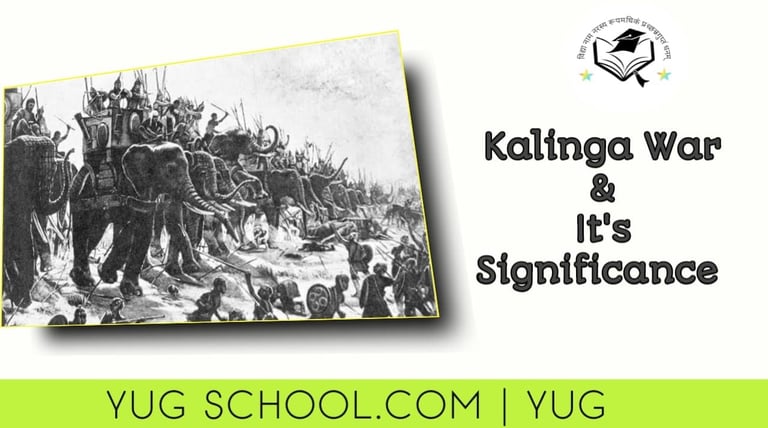Kalinga War and Its Significance
The Kalinga War was a brutal conflict fought in ancient India around 261 BCE between the mighty Maurya Empire, led by Emperor Ashoka, and the independent state of Kalinga
GENERAL STUDIES 1


Its causes, the battle, and how it profoundly influenced Emperor Ashoka and Indian history.
What was the Kalinga War?
The Kalinga War was a brutal conflict fought in ancient India around 261 BCE between the mighty Maurya Empire, led by Emperor Ashoka, and the independent state of Kalinga. Kalinga was a prosperous coastal region in present-day Odisha and parts of Andhra Pradesh in India.
Causes of the War
Strategic Importance: Kalinga held a vital position on trade routes connecting the Maurya Empire to regions in southern India. Controlling Kalinga meant greater economic power and influence.
Expansionist Ambitions: The Maurya Empire was on a path of aggressive expansion, and Kalinga, as an independent and powerful kingdom, likely represented a challenge to their dominance.
Personal Motivations (Unconfirmed): Some sources suggest that Ashoka's desire to conquer Kalinga may have been fueled by a sense of revenge as his father, Bindusara, had previously faced defeat in attempts to annex the region.
The Battle
The Kalinga War is known for its ferocity and the vast bloodshed it caused. Historical accounts suggest that over 100,000 Kalinga soldiers and many more civilians were killed. The Maurya Empire ultimately emerged victorious but at an unfathomable cost.
The Aftermath: Ashoka's Transformation
The devastation of the Kalinga War had a profound impact on Ashoka. The sight of the battlefield, filled with death and suffering, filled him with remorse and sorrow. He renounced violence and further military conquest, instead embracing Buddhism and the principles of non-violence (ahimsa).
Edicts of Ashoka: Ashoka inscribed his philosophies and policies on rock edicts and pillars that were placed throughout his empire. These edicts promoted peace, tolerance, and social welfare.
Spread of Buddhism: Ashoka became a patron of Buddhism, sending missionaries across India and beyond to spread the message of compassion and peace. Buddhism became a significant force in India and other parts of Asia.
Legacy of the Kalinga War
The Kalinga War stands as a pivotal, transformative event in Indian history. It marked a shift in Ashoka's rule from one of military might to one based on moral authority and social responsibility. The legacy of the Kalinga War highlights the devastating consequences of war and the power of peace and non-violence.
The Kalinga War holds profound significance in Indian history and the development of the Mauryan Empire under Ashoka the Great. Here's a breakdown of its importance:
Turning Point for Ashoka:
Shock and Remorse: The brutal bloodshed of the Kalinga War, with an estimated 100,000 deaths on the Kalinga side and heavy losses for Mauryan forces, deeply impacted Ashoka. The sight of suffering and devastation led him to renounce violence and conquest.
Embracing Buddhism and Ahimsa: Disillusioned by war, Ashoka converted to Buddhism, embracing the principles of ahimsa (non-violence), compassion, and peaceful coexistence. This transformation was a major turning point in his reign.
Transformation of the Mauryan Empire
End of Military Expansion: The Kalinga War marked the end of the Mauryan Empire's aggressive military expansion. Ashoka shifted his focus from physical conquest to 'Dhamma Vijaya' – victory through righteousness.
Welfare State: Ashoka's policies prioritized the well-being of his subjects. He initiated public works projects, built hospitals, promoted education, and supported religious tolerance. The edicts of Ashoka inscribed across his empire stand as testimony to his focus on social welfare and ethical governance.
Legacy of Peace and Non-violence:
Inspiration: Ashoka's embrace of non-violence and emphasis on moral principles became a powerful example throughout history, inspiring figures like Mahatma Gandhi and Martin Luther King Jr.
Buddhist Propagation: Ashoka played a pivotal role in spreading Buddhism throughout India and across Asia, sending missions to establish monasteries and promote its teachings.
Early Unification: While brief, the Mauryan Empire's control over a large portion of India, particularly after the Kalinga War, represents an early attempt at the unification of a significant part of the subcontinent.
Symbol of Resistance: The Kalinga War and the fierce resistance of the people of Kalinga against the Mauryan invasion became a symbol of courage and independence for later generations.
Historical Considerations:
Scale and Brutality: The Kalinga War's scale of violence highlights the brutal nature of warfare in ancient times.
Controversies: Some historical accounts may exaggerate the death toll or Ashoka's transformation for the sake of narrative. It is important to acknowledge that history is always subject to interpretations.
In summary, the Kalinga War was a watershed moment that profoundly altered Ashoka's trajectory as a ruler and the path of the Mauryan Empire. It left a lasting legacy of non-violence, and social responsibility, and stands as a stark reminder of both the horrors of war and the transformative power of remorse and compassion.
Significance of Kalinga War
